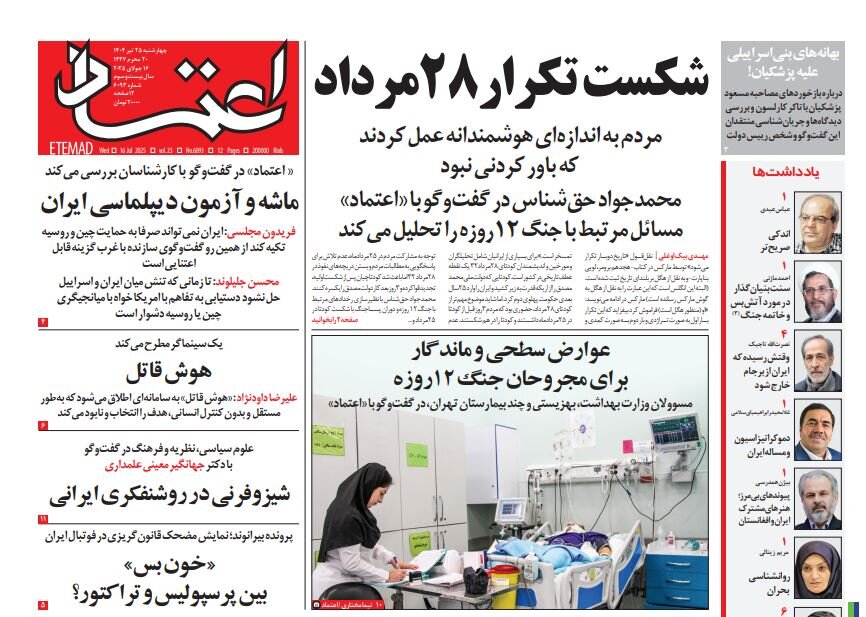Moscow's approach toward Tehran-Washington tensions

TEHRAN - In an interview with Qiuomars Yazdanpanah, a professor of geopolitics at the University of Tehran, Etemad examined Moscow's approach toward the tensions between Iran and the United States.
He said: Russia and Iran are two countries that have seen many ups and downs in their relations over the years. As two neighbors, they regard each other through a geopolitical and strategic lens. However, one point that should be noted is that Russia is not considered a significant player by other world powers. This is a reality that Iran must fully understand. The Israel-U.S. offensive against Iran (in the 12-day war) is exaggerated in order to convey this idea the Islamic Republic’s nuclear activities were a threat and are still a threat. This is a malicious move that could be used a pretext to escalate pressure or even trigger new confrontations with Iran. Therefore, Iran, by relying on official and documented arguments and data, should adopt positions toward any statement or position by Russian officials on issues related to Iran’s nuclear program, because the enemy is looking for excuses that can be used to justify actions against Iran.
=Shargh: Europe’s influence on the negotiation process
Shargh spoke with Mohammad Irani, a senior analyst on Middle East and Arab issues, about possible activation of the snapback sanctions by the European trio (France, Germany and Britian) and Iran’s nuclear diplomacy in the coming weeks or months. He said: Tehran has threatened to withdraw from the NPT if this (snapback) mechanism is implemented, which will push tensions to a boiling point. Therefore, Tehran and Washington, aware of the 30-day process for a return of UN sanctions, are probably looking for a temporary agreement through diplomacy to prevent Europe from taking such a step. Some believe that the activation of the snapback mechanism by the Europeans will not have much impact on the course of the Iran-U.S. negotiations, and that both sides will pursue their interests in the new round of negotiations. On the other side, some acknowledge that the activation of the snapback mechanism and the direction of the upcoming negotiations are two issues that are influenced by each other. Whether we like it or not, if the three European countries request the Security Council to activate the snapback mechanism, it will have an impact on the negotiations.
Arman-e-Melli: Active diplomacy is a necessity
In an interview with political affairs expert Mehdi Pazoki, Arman-e-Melli dealt with the negotiation and diplomacy as tools to prevent the activation of the snapback sanctions. He said: Obviously, adopting active negotiation and diplomacy are not only a choice but a necessity to preserve Iran's national interests. Any emotional reaction to the issue is playing on the field that Israel has designed, especially as Israeli officials have repeatedly emphasized that now is the best time to activate the snapback mechanism and complete the cycle of sanctions on Iran. Israel is capitalizing on the present conditions to sway U.S. and European support in its favor. Iran, relying on its strategic dominance in terms of international conditions and existing diplomatic capability, can manage the issue in a way that not only will resolve the crisis but also reduce foreign pressure, improve the economic situation, and rebuild the path of international interactions. At this point, there are opportunities for interaction that can be used with intelligence and excitement to benefit the country and prevent Israel's unilateral exploitation of the situation.
Khorasan: Good negotiation, bad negotiation
In a note, Khorasan discussed the quality of possible resumption of negotiations in the future and wrote: The recent 12-day imposed war against the Islamic Republic of Iran, which began amid the negotiations between the United States without any justification, once again showed that hegemonic strategies do not undergo fundamental changes with a change of faces and governments or discourses. The claim of preventing nuclear enrichment is only a cover for strategic pressure and imposing political will on the Iranian nation. But the Iranian nation, by exercising authority over years, given its recent experience, has chosen a strategy that is not emotional or ideological. Rather its logic is based on strategic rationality and Islamic principles. Its strategy is also derived from active resistance. Negotiations are not only permissible but necessary when we want to impose our will on the enemy. However, holding negotiations to please the enemy are by no means in parallel with Islam's political rationality. Based on Islamic teachings, negotiation is an intelligence move.
Leave a Comment